
185 posts
Latest Posts by purpletelescope - Page 4










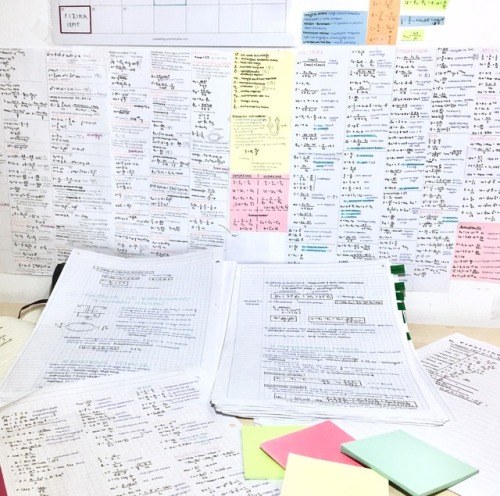
8 / 1 / 2018 //
Tomorrow I start my finals month and let’s just say physics midterm isn’t really the thing I want to start off with. but this is my life/desk situation right now, flooded with tons of formulas that just won’t go in my head easily:(




Mushroom landart by Jill Bliss

Hi ! Since a friend asked me for some tips to study better, I thought that it would be a good idea to share them with you all !
First of all, I started to have really good grades only once I started to apply exactly what is on this list ! On the beginning of the last year I had grades that went around 15/20 (French scholar system works with grades on 20, not on 100), which was good but I wasn’t the first of my class at all, and then in the end of the year and even right now, I have an average of 17/20 (without P.E obviously lmao), which is considered extremely good as a scientific senior student here !
Anyway I think that most of those tips are already well known but maybe you’ll find things that you didn’t think would work but actually do !
1- Do all of your homework (if possible)
This is some basic tip but God knows that it is the most important thing ever. Practice makes perfect, and I KNOW that sometimes you’ll be too tired to calculate the weight of a satellite which turns around the Earth in 239 days but even if you don’t feel like writing it down, just try to think about it, to find the methodology to do this exercise, because you have high chances to have this exercise again during your test ! Which lead us to the next advice…
2- Always write down the correction of your exercises when your teacher corrects them in class
Well I do think that it is the most important thing that I didn’t do last year and that I do now and it helps me so much. Like I said earlier, in maths, physics, literature and so on, there’s always a methodology that works almost universally for each type of exercise. So you have to listen carefully in class and take notes in case you didn’t understand something that might be important, and even after writing the methods and the corrections you don’t know what to do…
3- Ask a professor or a friend, or check videos on YouTube if this is still blurry in your mind
WE DON’T REPEAT THIS OFTEN ENOUGH BUT YOUR PROFESSORS ARE HERE AND PAID TO HELP YOU ! Even if you don’t like them, if you want to understand a subject you have to ask someone who could explain it to you ! If you’re in college and asking a teacher is not possible, then ask a friend you know they can explain it to you ! Don’t be ashamed of not understanding, this is absolutely natural. Then, if you still don’t understand, maybe you’ll find the answer to your question at our dear friend Google or even better, on YouTube ! Personally I think that Khan Academy is absolutely great for sciences ! Also I don’t really know about american YouTube channels that focus on school, so it’s up to you to find a channel that suits you ! (For my frenchies passant par là Les bons profs et Yvan Monka mes sauveurs).
4- Do not spend time uselessly !!!
Dear God how much time I spent on Twitter and YouTube just REFRESHING FOR NOTHING knowing that I have a test the next day 😭 I realized how much time Twitter would take me each day during the summer holidays so I decided to « delete » my account (I just log in once in a while so my tweets stay here, I don’t want to loose my threads on the Attack Titan and Hanji Zoe).
I also decided this year that once I’m home after school, I’ll just use my phone while I’m eating something and then leave it in the kitchen, and NOT USE IT until I finished all of my homework, even if it’s 10pm and half of my friends sent me a text about interesting things ! Also OBVIOUSLY no Netflix and series and anime once I’m done, but…
5- Don’t overwork yourself
If your studies are your priority like me, then you’ll put your homework before your activities, or even your sleep, because you’d feel guilty or even more stressed because you didn’t learn everything you had to and your test is the next day. Until now I can sleep at 1am and wake up the next day at 6 if I didn’t learn everything, and do that all the week until I have nothing to learn (this is an extremely rare case).
DO NOT DO THAT ALL THE TIME
You can allow you to do that when it’s a really important test, but if this is a really quick vocabulary test, then you should prioritize your sleep ! Then, if you’re really in deep shit you can learn on your way to school (flashcards yayy)! Sometimes when you’re really in a hurry your brain can memorize things so much faster I swear ! But of course, if you want to not do that all the time you have to be really organized, so next tip is…
6- Organize your week if you can !
This is so important to do that omg ! This is the newest thing I’ve been doing and it helps me sooooooooooo much omg ! Personally I have a bullet journal in which I organize what I’ll do each day, and (evenifthosedaysicompletelylostmybalance) now I can find some time for me to draw or just to sleep a bit more lol.
Make To-Do lists, have your own Bujo, just write down everything you have to do this week on your phone, at least you know you won’t miss something that might be important, and in the long run, you’ll find more time to learn your lessons and to do more exercises, and at the end of the semester you’ll have better grades ! But of course this is a question of MOTIVATION !
7- Last but not least, find a way to motivate you !
I think that if you want better grades, that’s for a reason after all ! Then if you’re feeling too lazy to work, just think about the reason that motivates you to go to class and to learn your lessons !
Making your parents proud, doing the job of your dreams, having a lot of money maybe, I don’t know what motivated you to read this post so far but just think about the pride you’ll have when receiving a 98/100! Then you’ll be able to help your friends with the subject you used to struggle with, and btw this is truly a wonderful feeling to graduate with all of your friends ! After that, the reward of holidays will be such a delightful thing 💕
This is all for now ! I might update this post if I remember something that I missed ! Also I’m really sorry if my English is awful, it’s been a while since I truly practiced it !
Just remember that even if you are in the top, intelligence doesn’t do all of the work and this is a progressive work that will help you getting even better results !
Edit: omgggg thank you so much for all those notes💕💕💕 ! I’d never imagine that this post would be this helpful !! I’m kind of curious about how much those tips helped you during the semester ! So if you think you see a progression do not hesitate to hit me up or leave a comment !
Physicists: the words we are using to define terms have specific mathematical definitions, so it’s important to use the correct words to talk about the correct quantity
Also physicists: Hahaha, luminous intensity isn’t an intensity, luminous flux isn’t a flux, and optical power isn’t a power!
This is really interesting! Is there any reason why this would be useful? Is it useful, apart from getting to save paper?

Pro-tip: You can use paper twice if you take your notes in pencil first and then write over it in pen.
@shitstudyblr please validate me
Bonus post: Thesis writing.
This post will be a combination of tips and tricks I have received from numerous sources, with the majority coming from Shinton Consulting and STREAM IDC staff.
The big T
If you’re anything like me, just the word ‘thesis’ can instill a sense of dread in me. However, the best way to deal with a phobia is to face it head on, so let’s do just that, both in a literal and metaphorical sense.
What a thesis is and what to expect…
Writing a thesis could take anywhere between four weeks to a whole year, and sometimes even longer! The worst thing you can do is compare your progress to that of others; setting a benchmark is one thing, but beating yourself into a panicked pulp because you haven’t written as many chapters as a fellow PhD/EngD won’t do you any good. The best thing you can do is have regular discussions with your supervisors on how long your thesis will take and plan accordingly. 🕖
Your thesis has to be fit for purpose (that is to pass), which means that it has to:
Satisfy the expectations of your institution and industry sponsor (if applicable).
How did you solve the problem that was proposed to you?
Contain material which presents a unified body of work that could reasonably be achieved on the basis of three years’ postgraduate study and research.
Show you have done the work and impress your examiners.
Allow your examiners to confirm that the thesis is an original work, which makes a significant contribution to the field, including material worthy of publication.
Research your examiners and quote them where possible, especially of they’re relevant to your field.
Show adequate knowledge of the field of study and relevant literature.
Make sure you read all of the key papers in your field.
What were the gaps in knowledge?
The ‘references’ section is very important as this sets the scene and examiners will read this. BUT, don’t have too many references.
Demonstrate critical judgement with regard to both the candidate’s work and that of other scholars in the same general field.
Compare approaches and conclusions of others.
Note potential conflicts of interest.
Why did you use this method/approach?
Is your interpretation the only possible explanation?
Be presented in a clear, consistent, concise, and accessible format.
Make your examiners lives easier.
Make your viva as pleasant as can be!
Basically, you need to know why your project was important, be able to explain the key work that has already been done in the area and how it relates to your research aim. You should then be able to explain what you have done during your research and how this contributes to your field.
Note: Keep checking university regulations! Each university should have their own code of practice for supervisors and research students, which will look something like this.
Picture: A short summary of the above. Source: Tumblr.

Planning and writing
I’m not going to lie to you, it is not going to be easy. I have only just embarked on the journey myself and am already overwhelmed. However, with the right preparation, coping mechanisms in place, and a tremendous amount of self-discipline, we will get through. ☕
Getting started
You need to practice writing. That’s as simple as advice gets.
You need to practice reading other PhD/EngD theses, mainly to understand what to expect, and to experience what being the audience for a thesis is like.
Create a thesis plan…
To start the mammoth task that is thesis writing, it needs to be fully understood and broken down into manageable chunks.
Make a plan (perhaps based on the table of contents of another thesis) of all the sections and chapters in the thesis.
Then break these into sections and keep breaking it down until you are almost at the paragraph level.
Now you can start writing!
Where to start the actual writing?
Start with the most comfortable chapter, such as a previously published paper, a set of results that are straightforward and can be easily explained, methodology/methods, etc.
Create a storyboard for you thesis and write as if you are telling that story.
If you’re not sure what comes next, refer to previous theses and back to your plan and storyboard.
Be ready to amend the plan for future chapters as each is completed and you become more aware of what the thesis must contain.
Remember: THINKING IS HARD, WRITING IS EASIER. 💭
Organisation
Develop and maintain a logical filing system.
Improve your back up technique; if it’s not saved in 3+ locations, it is not safely backed up.
Back up every day.
Never overwrite previous documents, just make many versions. It’s not worth the risk of losing a valuable piece of work from a copy and paste error.
Copy any key parts from your lab/note/field books as these can get lost/damaged.
Keep a file/folder of thoughts, references, etc. that you are not including in your thesis; these may be useful to refer back to for ideas and information.
Effective writing
Establish a routine, don’t be distracted, take breaks.
Set clear and realistic goals for each week/day.
A GANTT chart is very good for this; use it to keep on track and measure progress.
You just gotta start. The hardest part is the beginning.
Don’t stall on details, walk away for a short break to clear your mind.
Get formatting correct from the start (check your code of practice/regulations).
Be consistent with references.
Seek help from the experts - supervisors, postdocs, online sources/training programmes etc.
Create SMART objectives for your writing process:
Specific - e.g. “I will complete chapter 3/collate all diagrams” rather than “I will make good progress”.
Measurable - e.g. “I will write 4 pages today” not “I will try to write as much as I can”.
Achievable - e.g. “I will complete the first draft for my supervisor” not “I will get it perfect before he/she sees it”.
Realistic - e.g. “I will complete the introduction today” not “I will complete a chapter a week”.
Time - it can be useful to set yourself deadlines e.g. tell your supervisor you will hand in a draft on a certain day - that way you are sure to have it done.
Finally, find a balance between being tough with yourself whilst protecting your well-being the best you can. I wrote a post a little while ago that covers managing your mental health during a PhD. Read it here.
GIF: Anna Kendrick dishing out some top advice. Source: Tumblr.

A few more tips
Supervisor management
Establish what you want to cover in each meeting.
Keep a record of the outcomes and actions from those meetings.
Make your supervisors lives easy; they’re very busy humans.
They are unlikely to judge work unless it is presented completely (i.e. fully written with tables, figures, etc.).
Give them a neat, complete version of a chapter at a time (proof-read thoroughly and spell-checked).
It is in your supervisors interest for you to complete in good time; they are experts and will offer a lot of support.
To summarise, a good thesis:
Has an appreciation of what came before.
Focuses on the interesting and important.
Is well reasoned.
Will change the way people think.
Will teach your supervisors something.
Has publishable results.
Is logical in presentation, analysis, and arguments.
Is well illustrated with tables, figures, graphs, summary flow charts etc.
It is worth spending a lot of time on these.
Is written without grammatical and spelling errors.
Has an appreciation of what comes next.
I hope that the above was helpful! There are many resources out there, so get exploring if you need more advice!
I’ll soon be writing a post on how to survive your viva! So, watch this space. ✨
Photo: Make this your phone/desktop/laptop/everything background when you’re writing, I know I will! Source: Tumblr.

GETTING A JOB CHEAT SHEET!!
perfect resume for someone with no experience
A+ advice on writing cv’s
a guide to writing your resume
how to get a job fast as hell
resume writing tips
jobs and careers masterpost
how to answer interview questions
career and employment masterpost
resume template
strong words to use on a resume
34 crucial tips for your next job interview
how to write a cv
resume cheat sheet
how to write a cover letter
job hunting resources
Find a job in your field
7 questions you should ask at the end of every interview
how to get a job before you graduate
how to be good at interviews
other cheat sheets





the physics students
as requested by the wonderful @starferns
the chalkboard at the front of the lecture hall, covered in equations and graphs
visualizing a problem in your mind, step by step
cold water with ice cubes and a slice of lemon
diagrams drawn hastily on the corner of your paper, scribbled lines and half formed thoughts
replicating famous experiments and demonstrations
watching youtube videos late at night, picking apart complex theories
having an instinct for force diagrams and direction of motion
rushed, messy handwriting
finding beauty in motion and calculation and precision
seeing the universe as unimaginably small and unimaginably large at the same time
a well-worn grey sweater, frayed a little at the sleeves
equations scribbled on your arm until you know them by heart
studying newton and meitner and plank, all those who went before
talking with your hands, forming the shapes of arcs and trajectories as you work through a problem
long hallways and cold, sunny days
late night study groups
staring up at the sky, knowing exactly why and how the planets move as they do
trying einstein’s thought experiments
an old grandfather clock, pendulum measuring the passage of time
pages filled with calculations and precise strings of digits
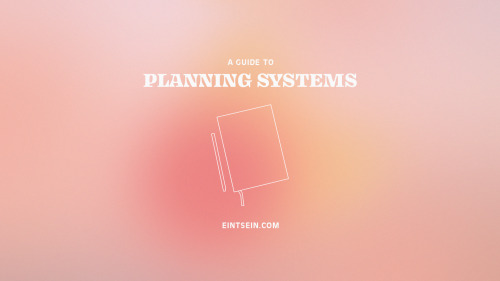
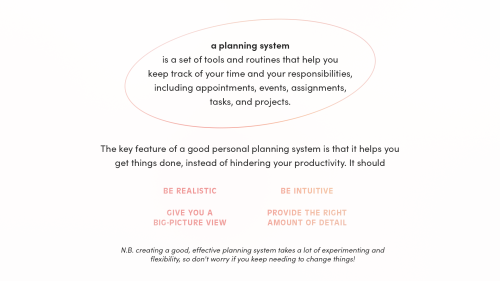
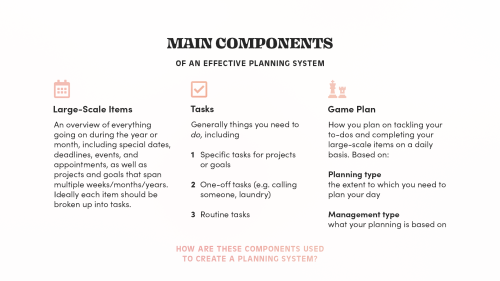
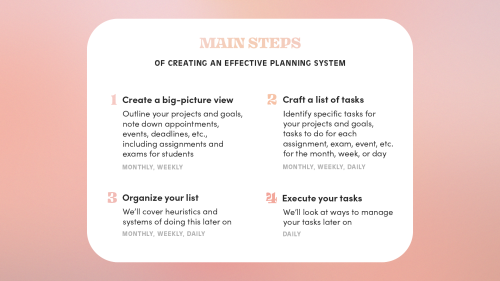
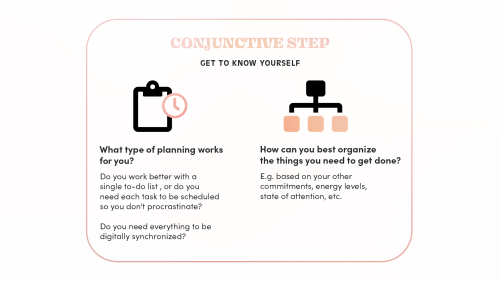
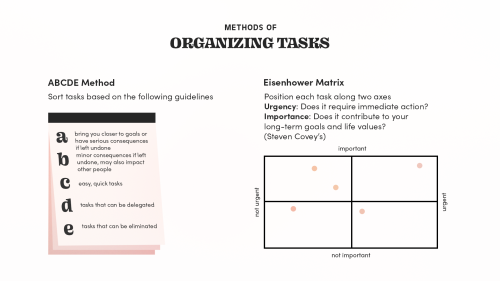
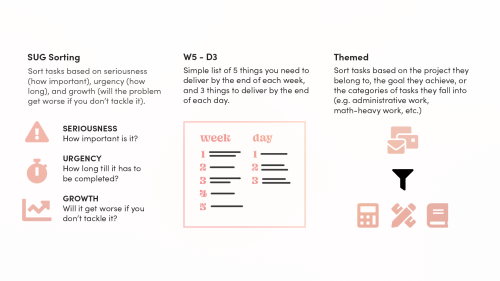
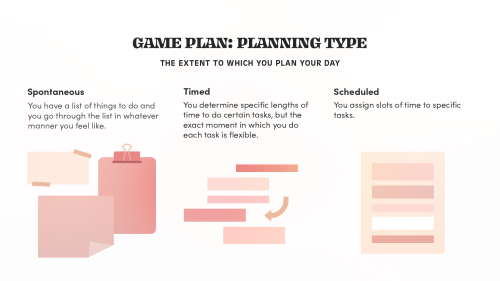
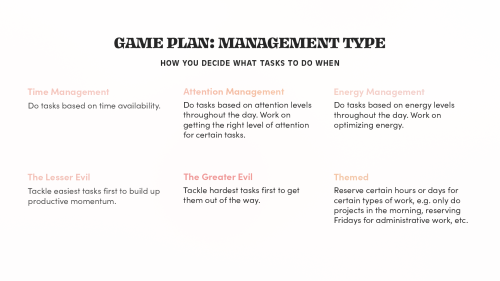
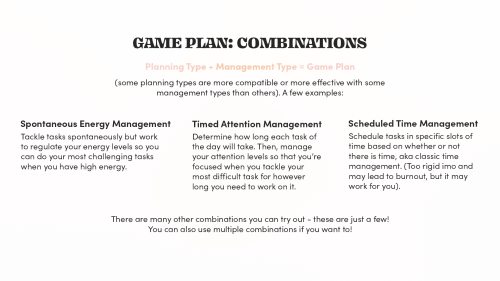
A Guide to Planning Systems
It’s important to have a system of getting things done, whether it’s tackling tasks as the day progresses or having a carefully planned schedule for every single hour of the week. How can you create an effective personal planning system that suits your needs and preferences?
Mentioned in this post:
Attention Management: How to Take Control and Live Intentionally
Energy Management: A Human-Based Organization Method
Flexible Time-Blocking: A More Breathable Way to Get Things Done
The ABCDE Method: Accomplish Tasks More Efficiently
My other posts
N.B. some categories include a few examples but they are no means limited to the ones listed here, e.g. there may be methods of organizing tasks other than the five listed here.

Day 13/100 of productivity · 1/30/21
Some late night notes for today! My boyfriend fell asleep really early and I had nothing better to do, so I decided it was time to study a little bit more. I feel like my motivation has been really high again lately & I am thankful for that, it would be really difficult to be this busy if I wasn't motivated.



22. jan 2021
school started for me this past tuesday so im hoping to post a lot unlike last semester! these are some small chem notes from unit 1 that my cat completely wrinkled...
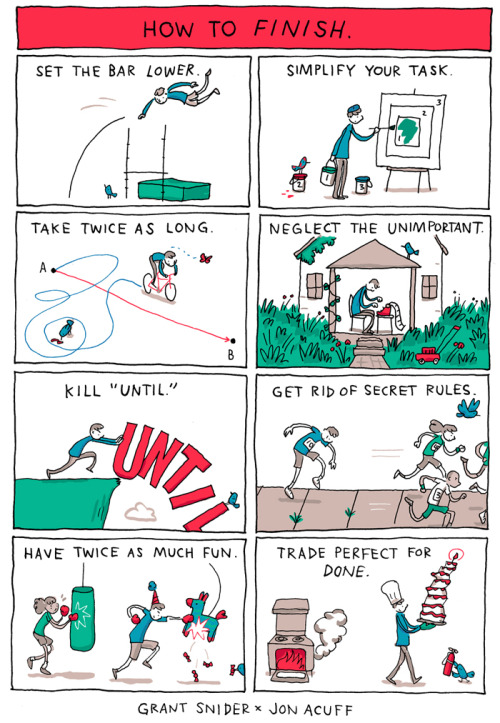
How to Finish
I drew this poster for Jon Acuff and his FINISH book tour. Big thanks to Jon for this collaboration, his book has some great ideas about how to complete creative and life goals.
Learning to like Physics
I actually cannot believe how much I used to hate Physics until last year, but then I actually took the time and effort to understand it and?? it’s so cool and fun and easy?? unreal.
It literally seemed impossible for me and I legit thought I wouldn’t be able to graduate because I was never gonna pass Physics (I’m a Math major so we actually have 4 required Physics courses). I don’t know what the point of this is but, don’t be afraid of Physics guys!! (or any other subject!!) yes it’s frustrating as hell and you feel dumb for not having a clue about what is happening or how to work out the problems but I swear once it clicks for you (and it will) it’s gonna be great.
So if anyone needs a step by step (for college/uni), here’s one:
Google is your best friend, the internet has plenty of videos/papers/worked out problems for you to check out. The most important thing to look for is drawings and videos that help you visualize what’s going on. In most of general physics, the key is to see what forces are acting, and from that follows everything else.
Know your core equations. Honestly it’s always the same ones in the end.
For mechanics: you absolutely gotta know Newton’s Laws, Work and its relation to Kinetic/Potential Energy. Momentum is also important.
For thermodynamics: pV = nRT, Boyle/Gay Lussac etc (note that they’re all connected), Carnot’s Cycle.
For electromagnetism: Maxwell’s equations. This is as far as I’ve gotten in my studies.
Understand where the formulas come from, rather than learning them by heart. For me, this was necessary because my memory is absolutely shit so there was no way I could remember every variation. But most of the formulas actually do make sense, and once you’ve drawn out a diagram of what’s happening, you can work them out yourself.
For the previous point, I suggest you watch and rewatch your professor’s explanation until you get the gist. Don’t get discouraged if it’s not immediately crystal clear, seek out other explanations if you need to. Then try to do it yourself.
ASK. FOR. HELP. I cannot stress this enough, do not feel ashamed about asking questions in class or during office hours. There are no stupid questions, and you’re paying thousands every year for people to teach you. Also physics is hard, so you’re pretty much expected to not understand immediately. Moreover, I can guarantee there’s at least one other person in the room with the same question who’s too afraid to ask. I was that person, and I failed the class because of it. Don’t be me.
Practice until you’re able to do most variations of standard problems. Once you’re able to do a certain problem, try to change it and see what happens. You don’t have to crunch the numbers all over again, go with your intuition first. Then you can calculate everything and see if you were correct.
This is all I’ve got at the moment. It applies to General Physics because I’m still pretty shit at Mathematical Physics (Rational Mechanics?) lmao, which is why I don’t talk about Lagrangians and such here.
If anyone has any other tips (for Mathematical Physics as well!) , please feel free to add them. Note that I’m from Italy, and this is what it was like for me. Other countries might have different ways of testing or focus on some formulas that I haven’t included. Do what works for you, obviously.
Good luck STEM students, I know it’s hard, but hopefully worth it in the long run :)


100 days of productivity | 62/100
First day of spring semester!
I can’t believe past me thought 4 classes in one day would be ok I’m so tired


100 days of productivity | 62/100
First day of spring semester!
I can’t believe past me thought 4 classes in one day would be ok I’m so tired


january 12, 2020
for the past 2ish weeks ive been in the protoproto stages of starting physics research with a professor :') the first steps of course are understanding special relativity and finding a suitable journal to put it all in 🌌
Jan 9, 2021

It wasn't a great week. But I did more than I thought I could. Importantly, I completed a difficult internship application. After a full burnout from last semester, I guess this was a good start. A lot of stuff that happened this week was revision of previous concept and I hope it won't be much difficult to catch up.
problem solving tips that actually worked for me
Hey there!
If you have a math, or science related subject (like I always do), you’ll find that you really can’t escape analysis and problem solving, especially if you’re majoring in something science or maths related. So I am here to share some tips that actually made studying technical subjects a little bit easier and manageable for me in college:
Practice solving. If you have a subject that requires you to solve, you really have to practice solving, there is no easy way out of this one. This allows you to develop your own technique in solving the problem. You can start by doing the problems you did in class, then venture out to some examples in textbooks, then further into the problems in the textbooks until you get the hang of how the concepts and theories are applied.
Listen during class. I know, it’s boring. But you have to do this. This way, you’ll be able to understand the topic once it is presented to you. In my opinion, it’s better if you let an expert explain it because they know the important bits in the lesson. Then study it afterwards on your own to develop your own techniques.
Ask your professors. Don’t be afraid to ask questions in class. Or if you’re shy, you can ask them after the class. However, it’s important that you ask them about the lesson when you already did your part; meaning: you already studied the material/solution over and over again but there’s just something that you can’t seem to grasp.
Study before the class. Studying the lesson in advance doesn’t hurt. Plus, it works because you already have an idea about it. However, I don’t do it usually. What I do is that prior the discussion, I study the lessons that are going to be essential to the next topic. Example: Say that our topic later will be about introduction to thermodynamics (which includes derivation of various thermodynamic formulas); what I’m going to study instead is the different integration and derivation techniques, and different basic thermodynamics concepts like laws of thermodynamics. This ensures me that I know the prerequisite lessons of the next topic in class.
Absorb the conceptual parts of the topic first. Before diving into the problems itself, try to digest the concepts or theories behind it first. This way, you can understand which information is important and easily think of a solution because you know the problem’s framework. Even when your professor gives you a problem that seems different from your other sample problems, the concepts will still be the same throughout.
Reverse engineer the solution. Reverse engineering is reading and understanding your solution from bottom to top. I do this to make connections while going through the solution. I usually ask myself “‘where did this come from?’, ‘why did this happen?’, or ‘why is the answer like this?’” It allows me to look into the parts that I missed which are usually concepts or theories that I forgot to apply in solving the problem.
Look for key terms or phrases. There are some problems that put in information that may seem unimportant, but actually is really important. Examples such as the phrases constant velocity, constant acceleration, starting from rest, accelerate uniformly, reversible isothermal, adiabatic conditions, isobaric/isochoric compression/expansion, etc., are easy to miss but actually gives you vital information especially when solving a problem.
Try to ask yourself how or why it happened in every step of the solution. You can do this to gauge your mastery of the lesson. If you can answer yourself confidently, then you’ve studied well enough. But, if you can’t or if you feel that it’s not enough, then you better get your pen, paper, and calculator to practice some more.
If you have to draw it, draw it. Some problems need the use of your imagination, and these problems are the ones that get tricky most of the time. It’s easier to draw each of the time frames that are important so you get the sense of what’s going on between these pictures. This way, you’ll know which information you’re missing and which ones are you failing to take into account.
It’s okay to be messy and slow while practicing. Not all of time you can solve in a tumblr-esque manner because, dude, tumblr notes or solutions are soooo pretty to look at, BUT, what’s more important is that you understand each step of the solution and how the answer came to be 8.0658 m/s directed 32° south of west. So it’s okay to have dashes, strikethroughs, and crosses on your scratch paper, as long as you’re learning, a messy solution on a paper you’re not going to submit to your professor is fine.
IF YOU’VE REALLY GOTTEN THE HANG OF SOLVING IT, try to solve a fresh set of problems as fast and accurately as you can. Try to solve as if you’re in an exam. This is also to gauge how well you’re prepared for it, but you need to do this accurately. I repeat, accurately. It doesn’t work if you’ve finished it in less than an hour but all of your answers are wrong.
Rest. If you know that you’ve done a good job, then take your mind off of everything first and let it wander to wherever it wants to wander. You deserve it ✨
Duolingo Spanish Vocab: Science

Duolingo recently rolled out a new feature that includes a dynamic list of vocabulary terms as new lessons are completed. I love this feature and its way of keeping track of words and phrases that are getting rusty, but I want a way to categorize the terms based on subject. Until a feature like that rolls out (if ever), I’m going to start posting subject- and lesson-specific vocabulary lists for Duolingo Spanish.
el análisis analysis
la atmósfera atmosphere
la ciencia science
el científico, la científica scientist
el concepto concept
los descubrimientos discoveries
la distancia distance
el elemento element
la energía energy
el equilibrio balance, equilibrium
la filosofía philosophy
la física physics
la fórmula formula
la función function
la información information
el laboratorio laboratory
el límite limit
la línea line
la masa mass
la materia matter
la medida measurement
el método method
el núcleo core, nucleus
la observación observation
la profundidad depth
el promedio average
la proporción proportion
las proteínas proteins
los puntos points
el químico, la química chemist
la superficie surface
la sustancia substance
la técnica technique
el técnico technician
la tecnología technology
la teoría theory
la temperatura temperature
la tesis thesis
la Tierra Earth
el universo universe
la velocidad speed
el volumen volume

My view immediately after my zoom meetings. Some notes from the most recent meeting, an empty coffee cup, and the makeup that I rushed to put on using my webcam before logging on😂
Happy Friday loves!


11.01.21 - day 2? / monday motivation and a double shot of expresso;; my project is off to a fairly good start! My review for e&m isn’t going as well, but I’ll still try to work on it and hopefully get to review some quantum before tomorrow too. Didn’t even have classes today but I am exhausted:^) well, here we go
Advice for studying in lockdown
Get yourself a thermos or insulated pitcher. Fill it with hot water. Bring a mug and a few tea bags back to your room. Now you have a day’s worth of hot tea at your fingertips.
Get away from the computer and take some pen-and-paper notes. I know it may be tempting to just stare at your screen all day, but any chance to rest your eyes is a good one.
On that note, invest in some computer glasses, or a blue light filter program for your computer. We’re all in the digital realm these days, and protecting our vision is important.
If you need to, set yourself a weird sleeping schedule. All of my classes are in the afternoon or evening, due to classmates in other time zones. I stay up til 2:00 am and sleep in until 10:00 am or later most days.
Have different clothes set aside for class. I understand the temptation to show up to that Zoom call in your pajamas, really I do. But your mind connects certain physical objects with certain activities, and it can be difficult to truly wake up when you’re giving your brain signals that it’s time to sleep.
For the same reasons, do not study in your bed. If you get sick of your desk or table, try spreading out on the floor instead.
Do not check the news before studying or class time. You will be distracted, anxious, and unable to focus. Get your own day in order first, then worry about what’s going on outside.
If you are struggling to feel productive even while you’re getting your schoolwork done, take breaks to do chores. It means you’re still getting things done, but you’re switching from mental progress to physical, tangible progress.
Go sit outside for a while. Leave your phone in the house and just sit on the front porch, or in the back garden. Being shut inside is not good for creatures like us, so we need all the sunshine and fresh air we can get.
Please, for goodness’ sake, do not compare yourself to other people. For every blogger out there proudly posting 3 pictures a day of their immaculate, artistic, detailed notes, there’s two dozen who have gotten absolutely nothing done and feel like shit because of it. Other people’s success is not your failure. We are all struggling right now, even those of us who are good at hiding it.

How to Finish
I drew this poster for Jon Acuff and his FINISH book tour. Big thanks to Jon for this collaboration, his book has some great ideas about how to complete creative and life goals.
The only acceptable solar system diagram!












